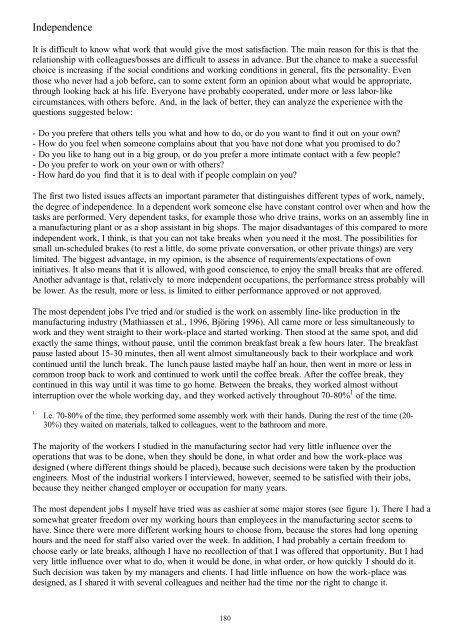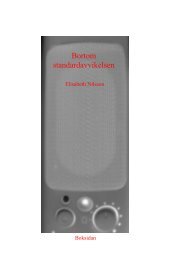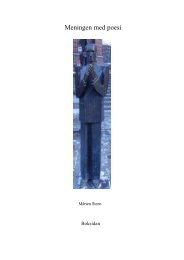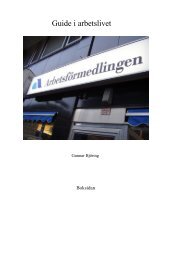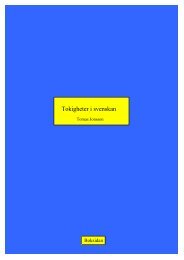Life – a user's manual Part II - Boksidan
Life – a user's manual Part II - Boksidan
Life – a user's manual Part II - Boksidan
You also want an ePaper? Increase the reach of your titles
YUMPU automatically turns print PDFs into web optimized ePapers that Google loves.
Independence<br />
It is difficult to know what work that would give the most satisfaction. The main reason for this is that the<br />
relationship with colleagues/bosses are difficult to assess in advance. But the chance to make a successful<br />
choice is increasing if the social conditions and working conditions in general, fits the personality. Even<br />
those who never had a job before, can to some extent form an opinion about what would be appropriate,<br />
through looking back at his life. Everyone have probably cooperated, under more or less labor-like<br />
circumstances, with others before. And, in the lack of better, they can analyze the experience with the<br />
questions suggested below:<br />
- Do you prefere that others tells you what and how to do, or do you want to find it out on your own<br />
- How do you feel when someone complains about that you have not done what you promised to do<br />
- Do you like to hang out in a big group, or do you prefer a more intimate contact with a few people<br />
- Do you prefer to work on your own or with others<br />
- How hard do you find that it is to deal with if people complain on you<br />
The first two listed issues affects an important parameter that distinguishes different types of work, namely,<br />
the degree of independence. In a dependent work someone else have constant control over when and how the<br />
tasks are performed. Very dependent tasks, for example those who drive trains, works on an assembly line in<br />
a manufacturing plant or as a shop assistant in big shops. The major disadvantages of this compared to more<br />
independent work, I think, is that you can not take breaks when you need it the most. The possibilities for<br />
small un-scheduled brakes (to rest a little, do some private conversation, or other private things) are very<br />
limited. The biggest advantage, in my opinion, is the absence of requirements/expectations of own<br />
initiatives. It also means that it is allowed, with good conscience, to enjoy the small breaks that are offered.<br />
Another advantage is that, relatively to more independent occupations, the performance stress probably will<br />
be lower. As the result, more or less, is limited to either performance approved or not approved.<br />
The most dependent jobs I've tried and/or studied is the work on assembly line-like production in the<br />
manufacturing industry (Mathiassen et al., 1996, Björing 1996). All came more or less simultaneously to<br />
work and they went straight to their work-place and started working. Then stood at the same spot, and did<br />
exactly the same things, without pause, until the common breakfast break a few hours later. The breakfast<br />
pause lasted about 15-30 minutes, then all went almost simultaneously back to their workplace and work<br />
continued until the lunch break. The lunch pause lasted maybe half an hour, then went in more or less in<br />
common troop back to work and continued to work until the coffee break. After the coffee break, they<br />
continued in this way until it was time to go home. Between the breaks, they worked almost without<br />
interruption over the whole working day, and they worked actively throughout 70-80% 1 of the time.<br />
1.<br />
I.e. 70-80% of the time, they performed some assembly work with their hands. During the rest of the time (20-<br />
30%) they waited on materials, talked to colleagues, went to the bathroom and more.<br />
The majority of the workers I studied in the manufacturing sector had very little influence over the<br />
operations that was to be done, when they should be done, in what order and how the work-place was<br />
designed (where different things should be placed), because such decisions were taken by the production<br />
engineers. Most of the industrial workers I interviewed, however, seemed to be satisfied with their jobs,<br />
because they neither changed employer or occupation for many years.<br />
The most dependent jobs I myself have tried was as cashier at some major stores (see figure 1). There I had a<br />
somewhat greater freedom over my working hours than employees in the manufacturing sector seems to<br />
have. Since there were more different working hours to choose from, because the stores had long opening<br />
hours and the need for staff also varied over the week. In addition, I had probably a certain freedom to<br />
choose early or late breaks, although I have no recollection of that I was offered that opportunity. But I had<br />
very little influence over what to do, when it would be done, in what order, or how quickly I should do it.<br />
Such decision was taken by my managers and clients. I had little influence on how the work-place was<br />
designed, as I shared it with several colleagues and neither had the time nor the right to change it.<br />
180


